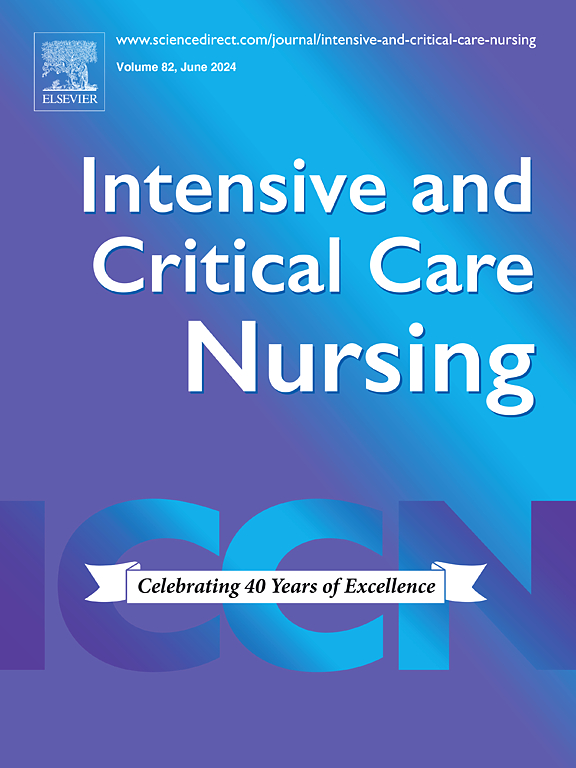创伤/外科重症监护病房机械通气患者的酒精戒断评估
IF 4.7
2区 医学
Q1 NURSING
引用次数: 0
摘要
目的酒精戒断综合征(AWS)是危重患者常见且可能危及生命的并发症。AWS已被证明会增加危重病人的死亡率和其他几种发病率。机械通气患者监测AWS的最佳方法尚不清楚。由于尚未在机械通气患者中验证使用临床研究所酒精戒除评估(CIWA-Ar),本研究的目的是确定使用Richmond激动镇静量表(RASS)或CIWA-Ar是否能改善机械通气重症AWS患者的预后。方法在某创伤外科重症监护病房进行回顾性、准实验性研究。接受创伤服务并接受症状触发苯二氮卓类药物治疗的机械通气患者包括在内。2020年4月之前,无论机械通气状态如何,AWS治疗均由CIWA-Ar指导。2020年4月以后,机械通气患者的AWS治疗以RASS为指导。结果共纳入48例患者(RASS: n = 24, CIWA-Ar: n = 24)。ras组患者平均ICU住院时间短(6天(-12 - 2.5)与9天[[5]、[6][7],[8],[9],[10],[11],[12],[13],[14],[15],[16],[17],[18],[19],[20],[21],[22]];P = 0.0224),机械通气的中位时间较短(2.6天[1.2-6.5]vs. 5.7天[2.3-9.8];p = 0.0253),与CIWA-Ar组相比。然而,RASS组的中位住院时间更长(16天[9.5-23]vs. 15天[12-47];p = 0.0328)。结论与CIWA-Ar相比,使用RASS指导症状引发的苯二氮卓类药物治疗机械通气患者的AWS可显著缩短ICU住院时间和机械通气持续时间。对临床实践的启示在急性脑卒中患者中实施RASS引导的监测算法可以更好地评估急性脑卒中高危通气患者。这可能缩短住院时间和机械通气的持续时间。本文章由计算机程序翻译,如有差异,请以英文原文为准。
Evaluation of alcohol withdrawal assessment in mechanically ventilated patients in a trauma/surgical intensive care unit
Objective
Alcohol withdrawal syndrome (AWS) is a common and potentially life-threatening complication in critically ill patients. AWS has been shown to increase mortality as well as several other morbidities in critically ill patients. The optimal method for monitoring AWS in mechanically ventilated patients is unclear. As the use of the Clinical Institute Withdrawal Assessment of Alcohol, Revised (CIWA-Ar) has not been validated in mechanically ventilated patients, the purpose of the study was to determine if the use of Richmond Agitation-Sedation Scale (RASS) or CIWA-Ar resulted in improved outcomes in mechanically ventilated critically ill patients with AWS.
Methods
A retrospective, quasi-experimental study was conducted in a Trauma Surgical Intensive Care Unit. Mechanically ventilated patients admitted to the trauma service and receiving symptom-triggered benzodiazepine therapy for AWS were included. Before April 2020, regardless of mechanical ventilation status, AWS therapy was guided by CIWA-Ar. After April 2020, AWS therapy for mechanically ventilated patients was guided by RASS.
Results
Forty-eight patients were included (RASS: n = 24, CIWA-Ar: n = 24). Patients in the RASS group had a shorter median ICU length of stay (6 days [2.5–12] vs. 9 days [[5], [6], [7], [8], [9], [10], [11], [12], [13], [14], [15], [16], [17], [18], [19], [20], [21], [22]]; p = 0.0224) and shorter median time on mechanical ventilation (2.6 days [1.2–6.5] vs. 5.7 days [2.3–9.8]; p = 0.0253) as compared to the CIWA-Ar group. However, the RASS group had a longer median hospital length of stay (16 days [9.5–23] vs. 15 days [12–47]; p = 0.0328).
Conclusion
Using RASS to guide symptom-triggered benzodiazepine therapy for AWS in mechanically ventilated patients was associated with significantly shorter ICU length of stay and duration of mechanical ventilation compared to CIWA-Ar.
Implication for clinical practice
Implementing a RASS guided monitoring algorithm in patients with AWS may lead to better assessment of ventilated patients at high risk of AWS. This may lead to shorter lengths of stay and duration of mechanical ventilation.
求助全文
通过发布文献求助,成功后即可免费获取论文全文。
去求助
来源期刊

Intensive and Critical Care Nursing
NURSING-
CiteScore
6.30
自引率
15.10%
发文量
144
审稿时长
57 days
期刊介绍:
The aims of Intensive and Critical Care Nursing are to promote excellence of care of critically ill patients by specialist nurses and their professional colleagues; to provide an international and interdisciplinary forum for the publication, dissemination and exchange of research findings, experience and ideas; to develop and enhance the knowledge, skills, attitudes and creative thinking essential to good critical care nursing practice. The journal publishes reviews, updates and feature articles in addition to original papers and significant preliminary communications. Articles may deal with any part of practice including relevant clinical, research, educational, psychological and technological aspects.
 求助内容:
求助内容: 应助结果提醒方式:
应助结果提醒方式:


